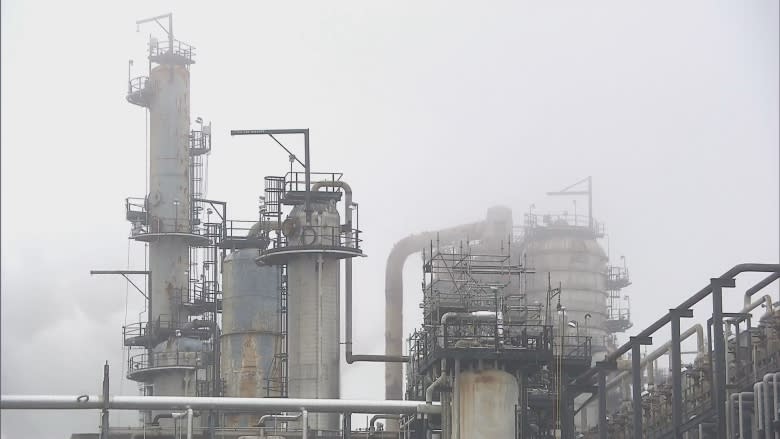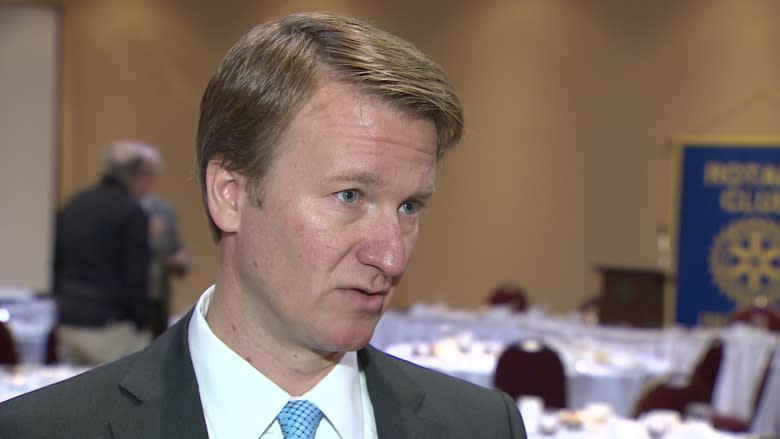Irving Oil could profit from new element of federal carbon tax plan
The Irving Oil refinery — New Brunswick's largest business — could end up mostly exempt or even profiting from the federal government's national carbon tax plan, according to new details released Thursday.
Federal Environment Minister Catherine McKenna announced Ottawa will be copying an element in Alberta's carbon tax system called "output-based pricing," meant to shield companies that would be made uncompetitive by a high tax on greenhouse gas (GHG) emissions.
- NB Power predicts much higher rate hikes after carbon tax
"We have spent a lot of time talking to businesses across the country to develop a plan that recognizes the need to be competitive," said Mckenna at a press event about the federal government's plan.
"Companies that are performing well with respect to other companies will not have to pay."
Under output-based pricing, manufacturers will be given carbon emission allowances and will only have to pay a tax on greenhouse gas emissions above that threshold. If a manufacturer's emissions are kept below the allowance, it will be issued credits it can use later or sell to other polluters.
Staying competitive
According to information released Thursday, carbon allowances for businesses will be set industry by industry with groups of manufacturers — such as oil refineries — competing against one another to generate the most output with the fewest emissions.
The Irving Oil refinery is New Brunswick's largest single source of greenhouse gases, emitting 2.97 million tonnes of greenhouse gas in 2015.
There was concern that a national carbon tax starting at $10 per tonne next year and rising to $50 per tonne by 2022 could undercut the refinery's competitiveness. It exports 80 per cent of its production to the United States in competition with American refineries that do not face a similar tax.
Last October, when the idea of a national carbon tax was first announced, there was no mention of possible accommodations for manufacturers and that had the industry deeply worried.
"If we have new taxation in New Brunswick that is not being imposed on manufacturers in other jurisdictions, then you have to take a look at that to determine whether New Brunswick could even compete in selling those products anymore," said Joel Richardson with Canadian Maufacturers and Exporters.
Now, instead of facing a carbon tax of $150 million per year by 2022, the refinery could pay nothing under output-based pricing, or even earn money if its emission allowance is high enough and it produces petroleum products more efficiently than other refineries.
Similar treatment will be available to other exporting industries, from breweries to sawmills.
Last October, a committee of New Brunswick MLAs from three parties endorsed the idea of a carbon tax to fight climate change but expressed worry about the effect it would have on the competitiveness of New Brunswick exporters.
"New Brunswick's largest industries (oil refining, pulp and paper) are energy-intensive and export-oriented. Getting the carbon price wrong could leave some industries facing large increases in production costs while struggling to compete against lower cost producers elsewhere," the MLAs wrote in their final report.
Carbon plan by 2018
The federal carbon tax plan will only be imposed in New Brunswick if the province does not adopt its own equivalent plan by 2018.
Premier Brian Gallant has said a decision on what the province will do is coming this year, but it is required to meet minimum standards set by Ottawa to "minimize interprovincial competitiveness impacts."
The decision by Ottawa to at least partially shield emissions of manufacturers from carbon taxes will allow New Brunswick to do the same if it develops its own plan.



